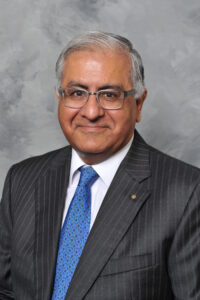Kishore Sakhrani: success story of a Hong Kong Indian
With over 24 years of experience, Hong Kong-based Kishore Sakhrani advises on taxation, corporate structuring, accounting, regulatory and trust related matters for both corporate clients and high net worth individuals.
He is chairman at the Board of Directors at Community Business Limited (CBL), a non-profit group promoting community involvement, diversity and non-discrimination in Hong Kong for over a decade. He also sits on the board of the Richard Ivey School of Business in Hong Kong.
Sakhrani is a past president of the Rotary Club of Hong Kong South and the former chairman of the Indian Resources Group, which was instrumental in obtaining full British passports for HK residents who would otherwise be left stateless after the 1997 handover of HK to China.
Sakhrani talks about his profound experience of living in HK, about the Indian community there and why HK becomes a global financial hub.
Q: There have been links between India and China from the days of Marco Polo… What is so striking about an Indian living in Hong Kong for so many years?
I grew up in Hong Kong and have seen its transition from a local trading community on the doorstep of a closed China to a frenetic international financial hub.
The most striking part of being in HK over the past more than five decades is how being an Indian is not a consideration in one’s day-to-day life. HK is an unusual place where an individual can flourish or perish entirely based on his own skills and efforts.
HK is a society, which from time to time, suffers from existential fears. From the 1969 riots when there was a risk that the Red Guards would cross the border, to the 1989 upheaval in China, to the 1997 handover to Chinese rule and the 2003 SARS epidemic, there have been times when the integrity of HK society has been called into question.
For the most part, the Indian community is well tolerated in HK. In many ways, the Indian community is unique in that it’s been incorporated into the fabric of HK society for well over a hundred years.
The government does a reasonable job in providing equal opportunities in housing, schooling and employment. There is very little corruption, relatively low bureaucracy, a range of public services and excellent infrastructure.
As in many other countries where Indian have migrated to, middle-class Indians do relatively well while working class Indians still suffer from low-level discrimination in the private sector. There is a consensus that the government needs to do more to integrate working class, ethnic minorities into the fabric of local society and, to their credit, there is some movement along that front.
 Q: You’re a former chairman of the Indian Resources Group, which was instrumental in obtaining full British passports for HK residents who would have been stateless after the 1997 handover of HK to China. How did you deal with the tough task?
Q: You’re a former chairman of the Indian Resources Group, which was instrumental in obtaining full British passports for HK residents who would have been stateless after the 1997 handover of HK to China. How did you deal with the tough task?
The lobbying for this issue began in the early 1990’s when it became clear that a number of people would effectively become stateless once the colony becomes a part of China. The people who held second-class British passports were most at risk and these included persons of Indian origin as well as ethnically British persons who had been born outside of the UK.
We were fortunate to have a good group of young Indian professionals who formed the core group and were particularly lucky to have one or two individuals who were very active in pushing this agenda along.
We lobbied the Hong Kong and British governments extensively and we took a reasoned, logical approach to the issue by highlighting the perceptual issues that this problem created for the UK authorities as well as the very limited impact that resolving this problem would create in the UK. We were also keen to reiterate that the resolution of this problem did not create a precedent for the UK authorities. Getting the press support and working with them to highlight the human aspects of this loss in citizenship was an important part of this lobbying effort. We kept working to ensure that the issue stayed on the table and was not forgotten.
Q: Hong Kong is a leading global financial hub that entered into specific agreements with China, which benefit HK’s position as gateway to China. Your comments…
The HK government makes a big issue about these, such as CEPA which is the Closer Economic Partnership Agreement. However, I don’t know of any firm that has chosen to base itself in HK because of these agreements.
What makes HK an effective gateway into China is its system of rule of law, which results in a transparent and impartial legal system, a simple tax system which is extremely favourable to investors, an extensive financial infrastructure, where all of the major commercial and investment banks, law and accounting firms and private equity investors, hedge funds and asset managers all operate, and a small but efficient civil service.
These interlocking systems create HK’s competitive edge. I don’t see these systems as being eroded anytime soon.
Q: Please share your experience in dealing with Asian corporate social responsibility (CSR) issues.
I chair the board at Community Business Ltd., an NGO that works with HK Corporates in the area of corporate social responsibility. Over the last decade, we’ve done research and provided advice on issues related to diversity and inclusion. These include research on topics such as Women on Boards of HK public companies, work-life balance as well as gender and sexuality issues at the workplace. We also provide advice to Corporates on how to develop and implement policies that improve the effectiveness of their CSR goals.
Currently there’s a lot more awareness in the corporate sector that developing policies that encourage diversity and inclusion, community involvement or better environmental practices is good for the bottom line, improves the firm’s visibility in their local marketplaces and is important in finding and retaining high-quality employees.
We find that foreign multi-nationals are more willing to be pro-active in these areas as are the visible, large local Corporates. For a lot of local firms, however, CSR is something that their chairman does, through his personal charitable foundation. The challenge, going forward, is to help the broader base of local firms to move towards a more structured and sustainable approach to better community involvement.
We are active in Indian marketplace where issues related to diversity and inclusion, resonate with the larger local Corporates.
Q: Tell us about your professional achievements…
For most of the 1980’s, I was an M&A banker in Toronto and moved back to HK in 1990. Since then, I have been actively involved in growing the ICS group, which I co-owned. We had a HK licensed trust company and a licensed investment advisory firm in the group. We had two core businesses: we worked with high net worth individuals from around the globe and also with Corporates looking to enter the China market. We developed a viable model that helped mitigate the risk of a China entry strategy for our clients and successfully grew our business to the point where we sold it in 2012.
For several years, I have been a speaker at international tax conferences on the tax aspects of doing business in HK.
Q: Indians in HK are a vibrant immigrant community. Some of the iconic names in HK today have been influenced and inspired by Indians, including the Star Ferry which was founded by Darobji Naorojee. H.N. Mody was one of the principal founders of HK University and Kowloon Cricket Club. What is the contribution of Indian business community to the growth of HK?
Indians have been in HK since its early days as a British outpost, either working in the Colonial civil or disciplined services and also in the private sector. Indian businessmen contributed to early HK by being involved in the foundation of the Star Ferry, HK University, Rutonjee Sanitarium and other institutions.
In its earlier days, Indian businessmen were an important part of the trading community in HK, at times when trading was a crucial part of HK’s identity and more recently, Indian traders forged important new markets for goods transshipped through HK
In the last several decades, the role of the Indian community has diminished, as HK became more of a gateway into China.
Q: You’re exposed to different cultures in such a small place. Tell us about your positive and negative experiences in HK
As the main gateway into China, the world comes to Hong Kong which means you get to meet and deal with people from many countries and cultures. You develop a tolerance to different cultures, religions and ethnicities and a sensitivity to differences.
This is basically a Chinese culture with ancient roots. Respect for elders, hard work, the importance of the family, self-reliance and an acceptance for authority are all facets of life in HK and you internalize these values as they are the same as in Indian culture. However, as in all major cities, these traditional values are being challenged across the board.
Growing up as a non-Chinese person in HK can be difficult for younger people. Not being Chinese but being part of a small minority group can make it harder to identify with one’s own culture, which is why it’s important for younger people to be given opportunities to be involved in Indian cultural events locally.
Q: Any social work you have been associated with…
Chair of the Board at an NGO called Community Business, an organization devoted to working with companies on their corporate social responsibility issues.
Member of the advisory board of the Richard Ivey School of Business in Hong Kong. The Ivey business school is the premier business school in Canada and runs an EMBA programme in HK
CFO of a small charity called ShelterBox Hong Kong. We are affiliated with ShelterBox UK, an organization devoted to disaster relief worldwide.
HK chapter president of the International Business Structuring Association, a UK-based organization focused on improving standards and knowledge of international business transactions.
Fund raising chair of my Rotary Club, whose main charitable efforts are towards funding a leprosy clinic in Northern China.
